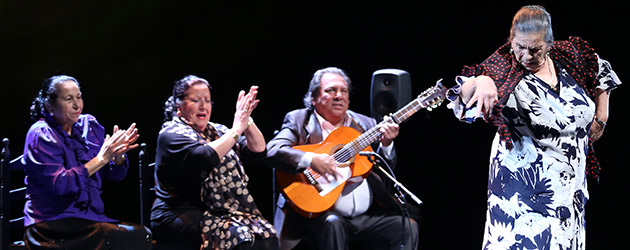Text: Sara Arguijo
Photos: Rafa Manjavacas
Title: Memoria. Place: Teatro de la Maestranza de Sevilla. Date: January 17th, 2015 Director and script-writer: José Luis Ortiz Nuevo. Case: Canela de San Roque, Carrete de Málaga, Gualberto García, Paco del Gastor, José Menese, Paco Taranto, Merengue de Córdoba, Manolo Sevilla, El Boquerón, Cuadro de las viejas del barrio de Santiago de Jerez, Ramón Amador. Attendance: two thirds
‘Memoria’: in search of that which was lost
Mario Benedetti once wrote that forgetfulness is a way of making light of history. So that's what «Memoria» is about, opening the doors wide in search of that which has been lost. And in this question is summed up the value of a show that this Saturday opened the new flamenco season of Seville's Teatro de la Maestranza.
The common denominator of the interpreters brought together for José Luis Ortiz Nuevo's show was the decade in which they were born, and the wisdom that only comes with time. The objective was a flamenco anthology that would synthesize the heritage they received, and to leave their own testimony of what is in store. In this sense, from the moment Gualberto García opened the program interpreting granaínas and verdiales with his sitar, along with the guitar of Ramón Amador, it occurred to us that maybe you have to be of a certain age to summarized this art-form in a simple way. In other words, all these people somehow showed, despite their different backgrounds, that life can be explained via a serene sort of flamenco, and from the peace that comes from having lived life to its fullest, with true knowledge of what is being sung, danced or played on the guitar.
But of course a show cannot sustain itself on good intentions, and «Memoria» ended up being a poorly-paced show, quite a bit colder that you would have expected, and uneven, except for the sensitive well-aged guitar-playing of Paco del Gastor remembering his uncle Diego…what sound, so luminous and so reminiscent of white-washed villages in that way of embracing the instrument. The solemn and powerful voice of the rebel, José Menese in the Romance of Juan García, and the tientos of «Señor que vas a caballo», and the fresh contemporary psychedelic sound of Gualberto whose sevillanas even went over big.
The truth be told, the choice of venue did not help, much too big to be able to find the intimacy with these veterans whom we've seen recently in better circumstances. And certainly audience complicity was lacking, an audience anxious to experience strong emotions and unable to find them. Not even the group of the older ladies from the Santiago neighborhood of Jerez with a pre-fabricated fiesta, or the alegrías the always irreverant dancer Carrete de Málaga regularly supplies. There was no substance to match the back-up supplied by El Boquerón, Manolo Sevilla and Ramón Amador, although we did all smile at some point, and feel the gentle pull of melancholy.
